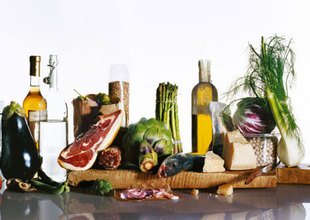|
by Ari LeVaux
November 10, 2010
At the Slow Food organization's biennial convention in Turin, Italy last weekend, I joined food lovers from around the world as they perused a vast indoor market stocked with some of the tastiest morsels to be coaxed from the land anywhere.
Samples were flowing in the great hall, dubbed the Salone del Gusto (Salon of Taste).
Rows of stalls filled the
324,000-square-foot exhibition space, offering delicacies like
prosciutto cured from the flesh of acorn-fed pigs, bread baked
on maple leaves, blue-tinged Persian salt, brewed beans gathered
from the wild coffee forests of Ethiopia, Sicilian spleen
sandwiches, and countless other gastronomic treasures.
There, 6,400 farmers,
fishermen, cooks, food activists, teachers and students from 161
countries were engaged in three days of intense dialog. This was the
other half of the Slow Food convention, called
Terra Madre, Italian
for Mother Earth.
Each is working on his or her own piece of a larger puzzle:
In addition to talking shop on a variety of issues related to food production, Terra Madre participants gave presentations to their colleagues on many subjects.
One, on the importance of the
moringa
tree in Kenya, might not seem relevant to, say, the Amazonian
Guarani tribal members in attendance. But the Guarani's
Juçara
tree, which produces palm hearts and açaí, fills a similarly
central role in their culture, and faces analogous threats from
environmental destruction. Other presentations covered topics like
sustainable seafood, seed patents and farming in arid climates.
Since then, the movement has turned into an organization that's been through many transformations, and is currently working to shed its image as a pleasure-based club of a privileged few who have the time and means to linger for hours at the dining table.
He started Terra Madre in 2004 to help
bring Slow Food in line with its mission of supporting food that's
"good, clean, and fair."
The participants were selected via an application process, and those chosen as delegates had their expenses paid by Slow Food.
And to this end, Terra Madre, by all accounts, is the most important program in Slow Food's portfolio of projects.
A new program of Terra Madre, "A Thousand Gardens in Africa," was unveiled at this year's event.
The plan will begin with work in countries that have an existing relationship with Terra Madre, including,
Once established, the gardens will spread to other countries, expanding the Terra Madre network.
The gardens will be cultivated with sustainable methods, and situated in schools and on community land in both urban and rural settings.
A big priority of the Thousand Gardens project is to restore prestige to small farmers, an occupation now often shunned by young people in Africa as in many other parts of the world.
The program will promote educational activities in conjunction with the gardens, helping children learn to appreciate good food, and drawing on planting and cooking techniques from elders. The gardens will include fruit trees, vegetables and medicinal herbs, with priority given to local varieties.
Slow Food chapters worldwide are invited to adopt one of these gardens.
The cost is 900 Euro, which will cover
equipment, training, coordination, educational material in local
languages, technical assistance, a contribution toward scholarships
for young Africans and financial assistance for representatives of
these projects to attend the international Terra Madre meeting.
Invoking the work pace of Slow Food's mascot the snail, Viertel reminded the group that,
Petrini spoke next, emphasizing transformation, whereby old ideas that still work can be maintained, as preferable to revolution, where the good is sometimes tossed out with the bad.
Nonetheless, the revolutionary spirit in
the room was palpable. There was chanting, clapping and stomping,
and the energy recalled that of other social movements.
The discussions included topics like,
Already, farmers in their early 20s are doing things like creating a program in South Africa that's trained thousands of teenagers in organic farming, or establishing a honey industry in Southern Brazil to provide economic incentive to save the local Caatinga forest.
Hearing about this kind of activity
inspired the other youth, and the elders as well.
The excitement generated, the information exchanged, and the networking that transpired at Terra Madre all conspired to invigorate a community that's driven to create real change.
The snail may be the Slow Food mascot, but I left Terra Madre believing that what happened there will expedite the pace of real change in the food systems of the world.
|

